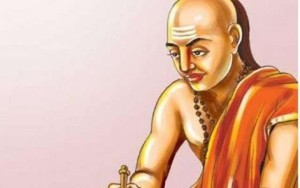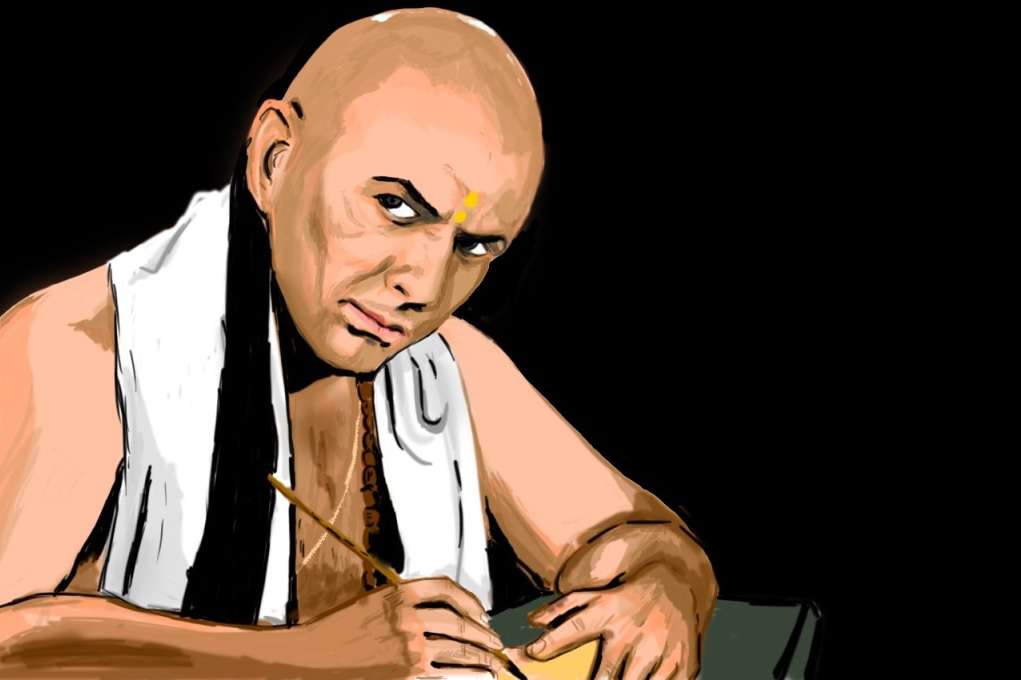No products in the cart.
Niti shastra is a great work of Chanakya. Chanakya was a man of letters and man of principles. His life revolved around following ideals to lead an ideal life. According to him, lofty ideals could become a certain reality if one intelligently works towards achieving his/her goals in a determined, progressive and practical manner. Niti shastra states that ‘Truth is the most bitter of all.’ Chanakya was aware of the realities of life and weaknesses of people. He knew that people know the truth, but still they embrace lies. He tried to minimize this dispute between truth and lies to a certain extent. The finer nuances of Niti shastra are as follows:
- Niti shastra mentions that many things in the world are such that they cannot give happiness unless they are crushed or grounded. For example, one cannot get color from Mehendi (kind of leaves) unless they are crushed. Similarly, a woman also will not glow in her true colors unless she works hard.
- In the book, Chanakya stated that a man who often depends on others seldom progresses in life. He beautifully explained it with the example of moon. The moon depends on the sun. Therefore, when the sun shines brightly in the sky, the moon is hidden by its astounding brilliance. Similarly, a man who seeks shelter in another’s house will always be treated as a lesser being. Therefore, it is necessary to be self-reliant. Chanakya asserts enhancing one’s own personality to achieve something in life.
- It is said that when misfortune occurs, intelligence deserts a man. However, Chanakya believed that misfortunes are often predetermined and one abandons rational thinking at such a time, which eventually leads to his/her downfall.
- Snakes have poisonous teeth and poison is present in the head of bees. In scorpions, poison is present in the tails. Chanakya portrays an interesting analogy by asserting that whole body of a man is poisonous. He considered an evil person to be the most poisonous.
- In the book, Chanakya question, ‘Why does a person with clean mind need to do pilgrimage? How is a man of virtues concerned with somebody else’s evil deeds?
- Chanakya states that snakes live in Ketki (the screw pine), while a lotus grows in muddy slush. The lotus is honored because of its virtues. He further aptly uses this comparison to state that a man shines only because of his noble deeds and virtues.
- Chanakya is considered to be the ’Maharshi of time management’. Chanakya states that there is a particular time for every work and one who works as per a plan and according to time is great.
- The book mentions that though an ant cannot be compared to an elephant, yet both co-exist in this world. This makes it very clear that the shape of an animal is not very important. Only, the work has significance.
- Chanakya writes in the book that a cow gives milk irrespective of what she eats. From this milk, the best of things are prepared. Similarly, whatever an intelligent man does, his knowledge is always worth following. By following his talk, you will attain some knowledge.
- Chanakya is an advocate of destiny. He states that whatever is written in the fate is bound to happen. Only through smart actions and hard work, one gets his fruits.
- Chanakya considered actions of man to be the most significant determiners of his positions in life. He believed that one cannot lie beneath a mango tree and expect a ripe mango to fall into one’s hands. Luck shall always elude the one who is unwilling to take pains to achieve his/her goals.
- Chanakya was also aware of the ultimate goal of life. He believed that like all the birds who spend night on one branch and fly away in the mornings, the world is like a waiting room where nobody belongs to anybody.
NITI SHASTRA ON VIRTUES
 Chanakya details the virtues of life in the book Niti shastra. According to Chanakya, if a person does not possess any virtue, he is said to be ineffective. He considers that virtue adds significance to beauty. To substantiate this, he added, that however beautiful a woman may be, if she were not virtuous, she would be like a barren land, which can never produce crops. According to Chanakya, the same concept applies to men as well. A man is worthless no matter how handsome, healthy and mighty he is, if he does not possess any virtue.
Chanakya details the virtues of life in the book Niti shastra. According to Chanakya, if a person does not possess any virtue, he is said to be ineffective. He considers that virtue adds significance to beauty. To substantiate this, he added, that however beautiful a woman may be, if she were not virtuous, she would be like a barren land, which can never produce crops. According to Chanakya, the same concept applies to men as well. A man is worthless no matter how handsome, healthy and mighty he is, if he does not possess any virtue.
Chanakya believed that good conduct adds significance to good lineage. If someone of this lineage is without virtue, then his status goes down. According to Chanakya, being knowledgeable is important. Learning is virtuous. He believed that learning is admirable only if it makes a man successful. Likewise, he considers that the virtue of wealth is in its use. Only that wealth is virtuous which is put to some use for oneself. If a miser amasses wealth, it turns worthless. Unused wealth becomes meaningless.
Chanakya was a wise scholar who viewed things from every possible aspect. He believed that virtue and vice are purely relative terms. They can be determined keeping the time, place and circumstance in mind. What is merit for one may be a flaw for another. One must always conform to one’s position in life. Chanakya gave more importance to the knowledge and power of a man. According to him, a scholar is worshipped everywhere. Irrespective of nationality, people who know the value of true worth admire such a man. Chanakya asserts that knowledge is a powerful asset in the hands of a scholar and it confers universal adulation upon him. A knowledgeable and learned man can achieve anything.
Chanakya further asserts that greatness begins with a vision and ends with a legacy. One should sincerely ignore the vices of men and learn from their virtues.
NITI SHASTRA ON RELIGION
Chanakya’s Niti shastra on religion includes a whole chapter on religion. Chanakya considered humanity as greatest of all religions. Chanakya noticed human beings entangled in Dharma. He never approved of this and so he imparted the real knowledge of Dharma or religion. He kept humanity on par with religion. It was on basis of this principle that he intended to improve lives. According to Chanakya, if God were the ruler of the world, then he would have no worries in his life. He believed that pilgrimage, worship and sacred bath purify the mind. He also advised that a man should maintain a good composure and maintain silence while taking his meals. He believed that one who keeps mum while having his meal, for at least a year, can have a place in heaven for millions of years.
TEACHINGS OF NITI SHASTRA
Chanakya explains Niti shastra as the maxims of the science of political ethics (niti) selected from the various shastras. In the book, he states that one can acquire knowledge of the most celebrated principles of duty by studying these maxims. The following are some of the teachings of Niti shastra:
- A wicked wife, a false friend, a saucy servant and living in a house with a serpent in it is analogous to embracing death.
- One should save his money against hard times, save his wife at the sacrifice of his riches, but should invariably save his soul at the sacrifice of his wife and riches.
- Save your wealth against future calamities. Never underestimate the wrath of God.
- Do not inhabit a country where you are respected the least. Ensure that you have a sustainable livelihood, good friends. Acquaint yourself with knowledge.
- Test a servant in the discharge of his duty, a relative in difficulty, a friend in adversity, and a wife in misfortune.
- He is a true friend who does not forsake you in time of need, misfortune, famine, or war, in a king’s court, or at the cremation.
- He who gives up what is imperishable for that which is perishable, loses that which is imperishable and without any doubt, he is bound to lose the perishable entities.
- He whose son is obedient to him, whose wife’s conduct is in accordance with his wishes, and who is content with his riches, has heaven here on earth.
- Foolishness is indeed painful, and verily so is youth, but more painful by far than either is being obliged in another person’s house.
- Those parents who do not educate their sons are their enemies; for so is a crane among swans, so are ignorant sons in a public assembly.
- Of a rascal and a serpent, the serpent is better of the two, for he strikes only at the time he is destined to kill, while the former at every step.
- The beauty of a cuckoo is in its notes while that of a woman in her unalloyed devotion to her husband, that of an ugly person in his scholarship and that of an ascetic in his forgiveness.
- As a whole forest becomes fragrant by the existence of a single tree with sweet smelling blossoms in it, so a family becomes famous and complete by the birth of virtuous children.
- For the twice born of the fire (Agni) is a representative of God. The supreme Lord resides in the heart of his devotees. Those of average intelligence see God only in his srimurti, but those of a broad vision see him everywhere.
Chanakya’s Artha Shastra – Arthashastra is considered to be the first book which incited nationalism into the Indians, and united them for the first time in the Mauryan dynasty. Arthashastra is a brilliant work, as pertinent today as it was in 312-296B.C., during which time it was inscribed. Read more : Chanakya Artha Shastra






